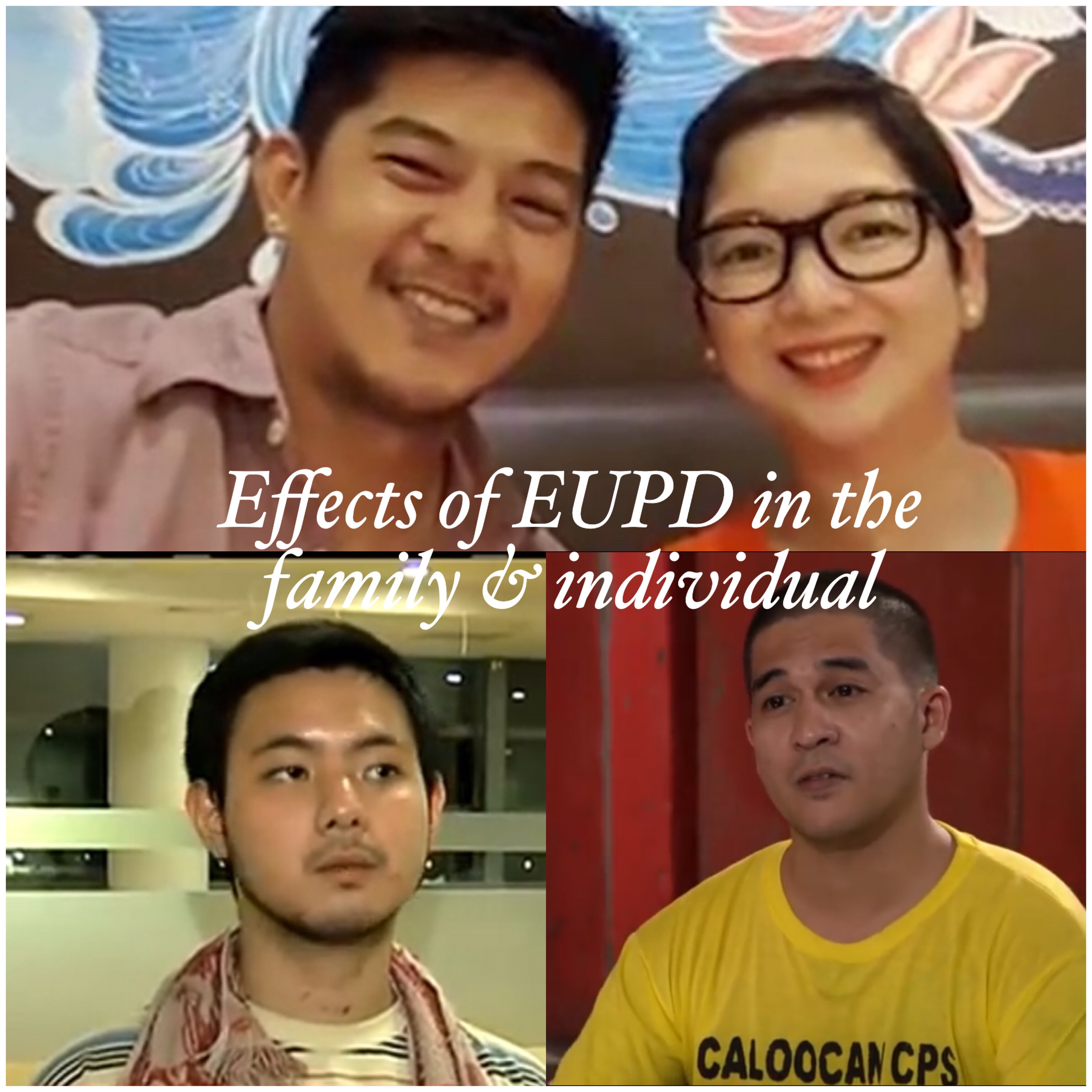Dear Bestfriend JPs and OFWs around the world,
We have been discussing about Emotionally Unstable Personality Disorder (EUPD) for the last seven (7) days. We want to understand how this disorder affect our fabric of society and most especially the OFW families. The EUPD seems little issue but if it becomes erratic and repetitive has the worst outcome. It is like a termite that little by little scavenging the mere foundation of the house then at the end, there is nothing to save anymore.
As common knowledge, we usually associate EUPD as individual differences over the marital issues of husband and wife but it is more than the individual differences. In domestic affairs, it is the unending, repeated and heightened argument over issues of finances and individual differences. If no one understand the issue of EUPD then the agony will prolong causes domestic violence affecting your individual life and lives of your children that will be passed through-out your children’s generation. I urge you to read the full stories and articles for you to have the idea of the issue of EUPD.
Stories of Justin Bieber, Britney Spears and Wakim (PBB 8) on Depression and Anxiety
Just recently Justin Bieber announced prioritizing his mental health therapy as he said on his Instagram on fixing his “deep rooted issues” as a way to become a better husband. He said he will be back soon to offer the fans new album and a better him.
Another Hollywood celebrity entered the mental health facility to address the emotional stress that she is experiencing over the decline of her father’s health. Britney Spears announced that he is having a “me time” to heal herself. She will be in the undisclosed facility for the duration of 30 days treatment.
After the Hollywood, you can watch Wakim of PBB 8 openly discussing the issue of metal health. His brilliance and braveness on the issue of bipolar and anxiety disorder provide huge awareness and clarity on the topic of mental disorder in the Philippine scene.
Why you can’t admit is the story about background and manifestation of EUPD?
Our topic will focus more on emotionally unstable personality disorder that is a common borderline personality disorder. As per statistics of US National Institutes of Health data of 2008, there was around 5.9% suffering in US for EUPD for a total of 1.6 % in population with this kind of disorder that causes break-up of the family if not diagnosed, controlled and treated professionally.
As to start, I want you to answer simple questions down below to give you the idea about our topic. The questions are not the standard format of actual questionnaires regarding emotionally unstable personality disorder or EUPD, but it will give you a better picture once you or one of your family encounters the dilemma on EUPD. It will help you recognize and understand yourself that you can rectify straight away or will give you a signal to call for medical help or counselling.
Please answer the below questions by your heart if below eight (8) instances suited your personality.
1. Is your mood fluctuating or changing frequently?
2. Are you too needy that you think your partner is your savior or too much clingy on your relationship?
3. You can’t control your emotions on any given time and occasions that you expressed extreme hatred or happiness?
4. Do you play as a victim on any given circumstances, blaming others to the fault that you have done and being an attention seeker?
5. Are you prone to lying, intentionally creating drama and simply neglecting the question/s of your partner to divert his/her attention on another situation?
6. Do you have extreme habits or manic behavior where you tend to overdo certain activity/ies at home that you get your satisfaction, security and relaxation?
7. Having an erratic or unresolved issue repeatedly with partner that causes fight or having a hard time keeping a stable or peaceful relationship?
8. Your face looks sad and your feeling seems heavy when you are staying longer inside the house that you end-up socializing with your friends and colleagues to be the center of their attention and to escape the atmosphere of the house, do you remember sad memory from your childhood that you feel depressed when staying longer inside the house?
There is no one will help you but yourself. Always think that the cure to the problem is the admittance before can be rectified.
I think my wife is disturbed is the email of an OFW from Hongkong expressing his domestic and marital problems.
Why I am discussing about EUPD, because one of our readers sent a disturbing email in his relationship with his wife. I will make his name anonymous to keep his privacy secret from our readers and to keeps his family covered on any issue regarding our topic, here is the excerpt of the email:
“Dear Jerichos Place,
I am an OFW working here in Hongkong, I am really disturbed that I am affected already by the kind of mentality of my wife. Before I can control myself, but I am becoming agitated already about her as we don’t have good memory of each other and even good communication. My wife doesn’t know how to focus herself in a conversation. She will tell only negative of her officemates, her supervisors and other people in their office every time she called me which is frustrating. She is coming home from work as if she is tired, but she came only with her peers having coffee outside.
I just notice that when she is at home there is no joy on her face, I am not exaggerated but the house will be turned into a haunted house because she doesn’t care of cleaning. All light switches are broken that she doesn’t care to repair. She has no schedule for everything, her personality seems very odd.
I have notice that she doesn’t have permanent friend, the one sticking with her is the people who only borrowed money from her or people that she is forced to close with for favors or her advantage but identified sticking with her even on college days. She has some friends in high school but not as solid real friends. She is not close to her sisters and brothers, even my mother is not closed with her. Our son is confused with her personality as she has no plan on everything but more of being impulsive.
Her ways are more of demure kind of personality…other words “pa-virgin effect”. On the first time you met her, she represents an aura of being approachable, she is like showing cordial but after a distant you can hear slanting words, she is so pretentious.
I am personally not the expert of the issue but because of the email sent so I am alarmed that I decided to feature the article to provide awareness regarding this disorder that affecting the domicile foundation of the family especially our OFW families.
What are the symptoms of EUPD?
I will discuss what is EUPD (emotionally unstable personality disorder) or BPD (borderline personality disorder) and correlated cause of EUPD, maybe both husband and wife are now suffering from this disorder that they don’t know why so much hatred is being accumulated and where it is coming from.
Find-out below the different symptoms of EUPD that leads to domestic violence between husband and wife. These are different situations where the wife and husband suffer emotionally, you can add your comments so that we can have more in depth understanding of the issue as to guide the families suffering for this kind of disorder:
1. Either the husband or wife cannot present the argument on calm manner.
2. Being disrespectful and obnoxious to his/her parents and parents-in-law in all situations.
3. Swinging moods, erratic behavior that leads to inconsistent decision making, one day he/she is okay then another day is hell atmosphere.
4. Manifest pathological lying by creating unverifiable stories.
5. Adopting advice not suited to the problems, always use reference (eg. this person is the one who made it, why this person) or blame others whenever he/she is needed to make his/her decisions.
6. Lack of true self or word of honor.
7. Opportunist who takes advantage of others rather than what he/she will give.
8. Not a home buddy, wants always to go out of the house. He /She feels toxic when inside the house.
9. Peers oriented that the house is the meeting point of all his/ her friends.
10. Impulsive and judgmental to other people.
11. Has a mentality of being suspicious and doubtful to other people, creating a notion that someone has a relationship with this person.
12. Has a notion of feeling deprived even he/she has so many things, jewelries, good dresses, house, car and many more.
13. Always hysterical
14. Apprehension on changing his/her field, dependent in all aspects.
15. Showy attitude
16. Has tendency to dominate his/ her partner, he/she is not thinking of his/ her words.
17. Nymphomaniac or no control in his/ her sexual desire even in open space or in trike parking area.
18. Mental depression and disturbance.
These are the symptoms that you can find-out to your partner who are suffering from emotionally unstable personality. These symptoms open lead to quarrel if not counselled or treated. An advice to those single that you need to know your partner before going to marriage, you may not know that the person has a long history of sexual abuse that requires treatment to gain his/ her respect to his/herself before committing to marriage.
I want to know is the article on knowing the details of EUPD?
I will provide the easiest explanation about the topic so that our readers can understand very well the issue of EUPD. According to Wikipedia, emotionally unstable personality (EUPD) is a long-term pattern of abnormal behavior characterized by the following:
1. Unstable relationships with other people
2. Unstable sense of self and unstable emotions.
3. There is often dangerous behavior and self-harm.
4. People may also struggle with a feeling of emptiness
5. Fear of abandonment.
Symptoms may be brought on by seemingly normal events. The behavior typically begins by early adulthood and occurs across a variety of situations. We have notice that the condition starts from childhood who experienced maltreatment and sexual abuse. Let us understand the issue of maltreatment and sexual abuse so that we have a forehand information on why it develops to EUPD.
As per study, there is a strong correlation between child abuse, especially child sexual abuse, and development of EUPD. Many individuals experienced the history of abuse and neglect as young children but still not confirmed. Patients with EUPD have been found to be significantly more likely to report having been verbally, emotionally, physically, or sexually abused. For some countries, caregivers are the one who initiate the abuse but for others it is their parents or their relatives. It has been suggested that children who experience chronic early maltreatment have tendencies to develop EUPD.
With World Health Organization reports, childhood maltreatment is characterized by abused and neglect for children under 18 years old. It includes all types of physical and/or emotional ill-treatment, sexual abuse, neglect, negligence and commercial or other exploitation, which results in actual or potential harm to the child’s health, survival, development or dignity in the context of a relationship of responsibility, trust or power. Exposure to intimate partner violence is also sometimes included as a form of child maltreatment.
The Root Correlation of EUPD on Maltreatment
We already explained that maltreatment happened with the hands of caregivers, parents and relatives. Now we want to know the classification of maltreatment to further explain the abuses happening inside the house or the family. This is to connect with EUPD so that we are aware of the inclination or effect of the disorder between wife and the husband who are now the new parents. We will look on to MSD Manual Professional Version to provide us the classification of maltreatment:
1. Physical abuse involves inflicting physical harm or engaging in actions that create a high risk of harm with forms of shaking, dropping, striking, biting, and burning (eg, by scalding or touching with cigarettes). Abuse is the most common cause of serious head injury in infants. In toddlers, abdominal injury is also common.
2. Sexual abuse is any action with a child that is done for the sexual gratification of an adult or significantly older child constitutes sexual abuse, forms sexual abuse include intercourse, which is oral, anal, or vaginal penetration; molestation, which is genital contact without intercourse; and forms that do not involve physical contact by the perpetrator, including exposure of the perpetrator’s genitals, showing sexually explicit material to a child, and forcing a child to participate in a sex act with another child or to participate in the production of sexual material.
3. Emotional abuse is inflicting emotional harm through the use of words or actions. Specific forms include berating a child by yelling or screaming, spurning by belittling the child’s abilities and achievements, intimidating and terrorizing with threats, and exploiting or corrupting by encouraging deviant or criminal behavior. Emotional abuse can also occur when words or actions are omitted or withheld, becoming emotional neglect (eg, ignoring or rejecting children or isolating them from interaction with other children or adults).
4. Child abuse in a medical setting when parents or caregivers intentionally produce or falsify physical or psychologic symptoms or signs in a child. Caregivers may injure the child with drugs or other agents or add blood or bacterial contaminants to urine specimens to simulate disease. Many children receive unnecessary and harmful or potentially harmful tests and treatments.
5. Neglect is the failure to provide for or meet a child’s basic physical, emotional, educational, and medical needs. Neglect differs from abuse in that it usually occurs without intent to harm.
Different types of neglect can be defined as
a. Physical neglect includes failure to provide adequate food, clothing, shelter, supervision, and protection from potential harm.
b. Emotional neglect is failure to provide affection or love or other kinds of emotional support.
c. Educational neglect is failure to enroll a child in school, ensure attendance at school, or provide home schooling
d. Medical neglect is failure to ensure that a child receives appropriate care or needed treatment for injuries or physical or mental disorders.
6. Cultural factors applying severe corporal punishment includes whipping, burning, scalding clearly constitutes physical abuse, but for lesser degrees of physical and emotional chastisement, the boundary between socially accepted behavior and abuse varies among different cultures. Likewise, certain cultural practices like female genital mutilation are so extreme as to constitute abuse.
We already know the six (6) classifications of maltreatment that involve physical abuse, sexual abuse, emotional abuse, child abuse in medical setting, neglect and cultural factors. We know also that these abuses correlates to EUPD (emotionally unstable personality disorder). It means the sad experiences we have when we are young are still there. It is still an excess burden that is not explained nor treated. It is the hatred not released for longer period.
Acceptance is the key talks on opening and admittance about having EUPD
How would it be the first step of acceptance for those people who are having an emotionally unstable personality? Let’s find-out for us to be enlightened so that we can help our OFW Families who are suffering from EUPD.
Understanding people with emotionally unstable personality are often labeled as having a bad behavior, manipulative, attention seeker and distressful personality. This is because they are driven by emotions inside them that they don’t know they have this disorder that triggers them anytime.
Steps of one’s diagnosing and coping mechanism for people who have EUPD:
1. Accept and understand that you have EUPD, learn and research about this personality disorder.
2. Diagnose yourself, if you experience at least five (5) of below manifestations that you feel last for hours and have affected your life so much:
a. Feel very worried for people abandoning you.
b. Very intense emotions that last for hours and day then sudden change from feeling happy to sadness.
c. Have no strong sense of oneself but change abruptly depending on people you are attached with.
d. Hard to keep and make stable relationship.
e. Always have emptiness inside
f. Impulsive in action or decision manifests in driving recklessly, drug addictions and binge eating.
g. Suicidal tendency or harming oneself.
h. Intense hatred that is difficult to control
i. Stressful with sometimes paranoia and dissociation.
3. Validate your own diagnosis with medical help to recommend proper remedy.
4. Continues process of acceptance and knowing oneself, join a support group with other EUPD family.
5. Learn to voice-out your feelings in calm manner until it becomes a habit through time then don’t forget your physical health and exercise.
Bestfriend JPs and OFWs around the world, the Emotionally Unstable Personality Disorder can be healed and controlled. But the person itself should realize that he/she is responsible to help first him/ herself so that support will come easily. The key step toward a successful relationship is to have continued open communication without criticism or blame to one another in a calm manner then avoid gadgets and television to have an open talk in a family. Join and create a family support group with other EUPD who understand this kind of situation.
End of Webseries Episode!
(YOU TOO can invite us to cover your events and product presentations for FREE to be featured in our blogs @ http://jerichosplace.com, Jon & Jeri at YouTube/Jericho’s Place Channel, FREE selling, posting of products & services @ https://market.jerichosplace.com. We are ready to serve you even on a simple gathering to make your event meaningful just message us at Whatsapp no: +971-525527986. Our Bestfriend JPs and OFWs around the world, we will wait for your comments and invitation down below.)
References:
1) https://www.mind.org.uk/information-support/types-of-mental-health-problems/borderline-personality-disorder-bpd/about-bpd/#.XNHGNugzZPY
2) https://www.helpguide.org/articles/mental-disorders/helping-someone-with-borderline-personality-disorder.htm/
3) https://www.google.com/search?q=acceptance+is+the+key+for+borderline+personality&rlz=1C1CHBF_enKW803KW803&oq=acceptance+is+the+key+for+borderline+personality&aqs=chrome..69i57.13595j0j7&sourceid=chrome&ie=UTF-8
4) https://www.google.com/search?q=recommendation+for+a+person+having+emotionally+unstable+personality&rlz=1C1CHBF_enKW803KW803&oq=recommendation+for+a+person+having+emotionally+unstable+personality&aqs=chrome..69i57.20555j0j8&sourceid=chrome&ie=UTF-8






